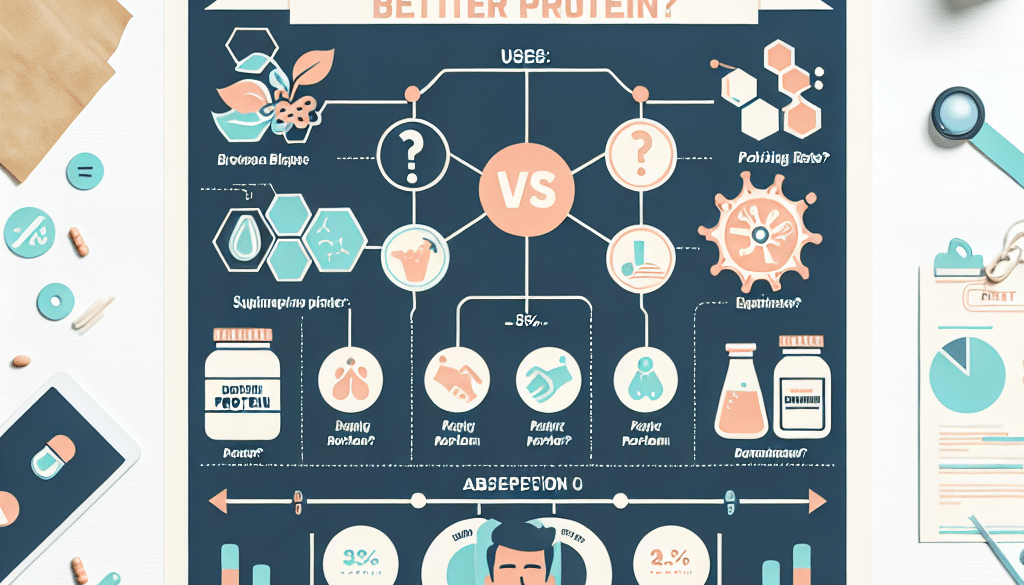Are Peptides Better Than Protein?
-
Table of Contents
- Peptides vs. Protein: Understanding the Superior Choice for Your Health
- Understanding Proteins and Peptides
- Comparing the Benefits of Peptides and Proteins
- Benefits of Proteins
- Benefits of Peptides
- Peptides and Protein Absorption
- Peptides in Medical and Therapeutic Use
- Protein Quality and Sources
- Are Peptides Better Than Protein?
- Conclusion: Making the Right Choice for Your Health
- Discover ETprotein’s High-Quality Protein Products
Peptides vs. Protein: Understanding the Superior Choice for Your Health

When it comes to nutritional supplements, the debate between peptides and proteins is a hot topic among fitness enthusiasts, athletes, and health-conscious individuals. Both are essential for the body’s structure, function, and overall well-being, but they serve different roles and have unique benefits. This article delves into the science behind peptides and proteins, compares their advantages, and helps you understand which might be the better choice for your health goals.
Understanding Proteins and Peptides
Before we compare peptides to proteins, it’s crucial to understand what they are and how they function in the body.
- Proteins: Proteins are large, complex molecules made up of long chains of amino acids. They are essential for the structure, function, and regulation of the body’s tissues and organs. Proteins are involved in virtually every process within the body, including muscle repair, immune response, and the creation of enzymes and hormones.
- Peptides: Peptides are smaller chains of amino acids that are formed when proteins break down. They can be thought of as the building blocks of proteins. Peptides often act as signaling molecules in the body, influencing a wide range of physiological functions. Some peptides have been found to have therapeutic properties, leading to their use in medications and supplements.
Comparing the Benefits of Peptides and Proteins
Both peptides and proteins offer a range of health benefits, but they do so in different ways. Here’s a closer look at what each has to offer:
Benefits of Proteins
- Muscle Growth and Repair: Proteins are essential for muscle growth and repair, making them a staple in the diet of athletes and bodybuilders.
- Enzyme and Hormone Production: Many enzymes and hormones are proteins, which are crucial for metabolism and other bodily functions.
- Immune System Support: Antibodies, which help fight off infections, are a form of protein.
- Energy Source: In the absence of carbohydrates and fats, proteins can serve as an energy source.
Benefits of Peptides
- Enhanced Absorption: Due to their smaller size, peptides can be more easily absorbed by the body compared to proteins.
- Therapeutic Effects: Specific peptides have been shown to have therapeutic effects, such as antimicrobial, antithrombotic, and immune-modulating properties.
- Signaling Molecules: Peptides can act as hormones or signaling molecules, influencing various physiological processes.
- Targeted Action: Some peptides have the ability to target specific organs or systems in the body, which can be beneficial for treating certain conditions.
Peptides and Protein Absorption
The body’s ability to utilize peptides and proteins is largely dependent on absorption. Proteins must be broken down into peptides and then further into amino acids before they can be absorbed in the small intestine. Peptides, being smaller, can be absorbed more quickly and efficiently. This rapid absorption can be particularly beneficial for post-workout recovery when the body needs nutrients to repair and build muscle tissue.
Peptides in Medical and Therapeutic Use
Peptides have gained significant attention in the medical field due to their potential therapeutic uses. For example, insulin, a peptide hormone, is essential for the regulation of blood sugar and is used in the treatment of diabetes. Other peptides are being studied for their potential to promote wound healing, act as anti-inflammatory agents, or serve as antibiotics.
Protein Quality and Sources
Not all proteins are created equal. The quality of protein is determined by its amino acid composition and digestibility. Complete proteins contain all nine essential amino acids in sufficient amounts and are typically found in animal products. Plant-based proteins can be complete as well, such as soy, quinoa, and buckwheat, or can be combined (e.g., rice and beans) to provide all essential amino acids.
Are Peptides Better Than Protein?
The answer to whether peptides are better than protein depends on your specific health goals and needs. For general health and nutrition, a balanced diet rich in high-quality proteins is typically sufficient. However, for those looking to enhance recovery, improve specific health conditions, or for whom digestion and absorption are concerns, peptide supplements may offer additional benefits.
Conclusion: Making the Right Choice for Your Health
In conclusion, both peptides and proteins are vital to our health, each with its own set of benefits. Proteins are essential for overall nutrition and bodily functions, while peptides may offer more targeted health benefits and enhanced absorption. The choice between peptides and protein should be based on individual health goals, dietary preferences, and any specific health conditions.
Discover ETprotein’s High-Quality Protein Products
If you’re looking for high-quality protein products, ETprotein offers a range of organic bulk vegan proteins that cater to various dietary needs and preferences. Their products are characterized by a neutral taste, non-GMO, allergen-free attributes, and are suitable for a wide range of industries.
About ETprotein:
ETprotein, a reputable protein and L-(+)-Ergothioneine (EGT) Chinese factory manufacturer and supplier, is renowned for producing, stocking, exporting, and delivering the highest quality organic bulk vegan proteins and L-(+)-Ergothioneine. They include Organic rice protein, clear rice protein, pea protein, clear pea protein, watermelon seed protein, pumpkin seed protein, sunflower seed protein, mung bean protein, peanut protein, and L-(+)-Ergothioneine EGT Pharmaceutical grade, L-(+)-Ergothioneine EGT food grade, L-(+)-Ergothioneine EGT cosmetic grade, L-(+)-Ergothioneine EGT reference grade and L-(+)-Ergothioneine EGT standard. Their offerings, characterized by a neutral taste, non-GMO, allergen-free attributes, with L-(+)-Ergothioneine purity over 98%, 99%, cater to a diverse range of industries. They serve nutraceutical, pharmaceutical, cosmeceutical, veterinary, as well as food and beverage finished product distributors, traders, and manufacturers across Europe, USA, Canada, Australia, Thailand, Japan, Korea, Brazil, and Chile, among others.
ETprotein specialization includes exporting and delivering tailor-made protein powder and finished nutritional supplements. Their extensive product range covers sectors like Food and Beverage, Sports Nutrition, Weight Management, Dietary Supplements, Health and Wellness Products, and Infant Formula, ensuring comprehensive solutions to meet all your protein needs.
As a trusted company by leading global food and beverage brands and Fortune 500 companies, ETprotein reinforces China’s reputation in the global arena. For more information or to sample their products, please contact them and email sales(at)ETprotein.com today.












